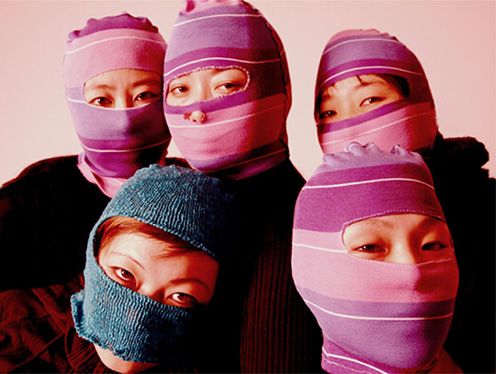
Forum Lectures #20: UFOlab
Historicizing the artists' collective UFOlab's work with transnational adoption
The lecture will re-examine the artist group UFOlab's performances and interventions. To even be able to start to talk about art, self-organization, friendly activism, and adoption one must bring up the history of the global phenomenon of transracial and transnational adoption and how the Northern European countries are among the principal receiving/trafficking countries of adoptees per capita in the world. One must also take into account that when UFOlab was founded in 2004 it was during a time when BIPOC artists often worked alone or in relative isolation from peers because of geographical distances and/or expectations to assimilate to prevailing values, behaviours and attitudes in the art world and broader society. It was before social media made it easy to find and connect with other BIPOC artists and when art institutions could easily bypass the individual BIPOC artist and diminish the ‘adoptee artist’ for being either self-indulgent, ‘identitarian’, angry or unthankful. It was however more difficult to ignore a strong collective formation. It was within this context that UFOlab became one of Scandinavia’s first East Asian diaspora and women artist groups of colour. There was no precedent in Scandinavia for East Asian diaspora artists to connect and organise together as an artist collective. As a unified entity, UFOlab could speak from a multi-voiced platform. Thematically, through their collective art practice, they made public interventions that contested and re-framed normative perceptions of racism and transnational adoption from a post -and decolonial feminist viewpoint. During the years when UFOlab was active, the group produced exhibitions, talks, events, performances as well as public interventions. Twisting everyday situations, norms and expectations and highlighting structural hierarchies, the group made visible prevalent prejudices and stereotypes. UFOlab was primarily active in Denmark and South Korea but through their collaborations and outreach, they connected with a global network of cultural workers, activists and researchers who contested official narratives around transnational adoption by adoption agencies, sending and receiving countries, working instead towards adoptee rights and nuancing the discourse around transnational adoption and its complex global history tied to war, militarism, white privilege, patriarchy, and class.
Guest moderator: Lene Myong, Professor, University of Stavanger.
The lecture is free and open to everyone interested.
About UFOlab
UFOlab [Unidentified Foreign Object Laboratory]
Active during the years 2004–2010. The group consisted of five artists: Anna Jin Hwa Borstam, raised in Sweden, and Charlotte Kim Boed, Trine Mee Sook Gleerup, Jane Jin Kaisen and Jette Hye Jin Mortensen, raised in Denmark. All are adopted from South Korea.
Forum Lectures
Forum Lectures is a series of lectures by Danish and international thinkers and cultural workers reflecting on how art co-forms commonality. Forum Lectures bring thinking and shared study back to the university and invite public lectures on the last Tuesday of every month from 17:00 - 19:00 (please note, that this lecture is on a Thursday).
The initiative is hosted by the research group of the New Carlsberg Foundation research centre Art as Forum. Our researchers are occupied by a.o. the infrastructures of the arts, collective modes of production, the entanglement of political theory and aesthetic theory, assembling strategies of curation, dematerialized art, acts of strategic separatism and temporality in digital art.
Map of South Campus
View directions.
View on map of the Faculty of Humanities - South Campus.
View map of South Campus (pdf).
